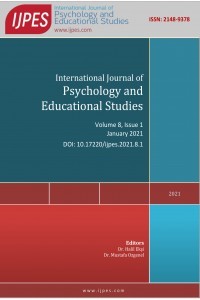A Study Of Creative Writings In Urdu Of The Secondary School Students
Psychologists and educators throughout the world paid attention to creativity and creative thinking. The routine type of tasks in the school appears to be very simple and uninteresting to the creative students. Atmosphere of some schools is conducive for the development of creative potential. Whereas the atmosphere of many schools comes in the way of its development. Children prefer to learn in creative ways rather than just memorizing information provided by a teacher or parents. It is generally assumed that Children are highly creative, with vivid imaginations, and that they learn by exploring, risking, manipulating, testing, and modifying ideas. Language allows children to talk to each other and to write their thoughts and ideas and mother tongue is the most important and comprehensive medium for expression. Self-expression in reading, writing and speech; reading of suitable general books of high quality with interest rather than concentration on textbooks: approach to literature as a source of joy and inspiration rather killjoy drill in grammar and vocabulary. Children learn to connect individual words with objects, ideas, and actions. In the process, they write their thoughts and ideas in very creative ways. The Researcher took this study to know the written potential of Urdu medium students. In this paper, The researcher emphasized that Urdu speaking children are not less than children of any other language. The only problem is less opportunities for them. The Researcher found that Urdu medium students are naughty, distracted, disturbed due to various reasons but at the same time they are highly creative in writing.
Keywords:
Creative writing, Urdu Secondary school,
___
- Baron, R. A., & Misra, G. (2014). Psychology (Indian Subcontinent Edition), Delhi: Pearson India Education Services. Creativity
- Innovation, Psychology Today Retrieved on May 06, 2016 from from
- https://www.psychologytoday.com/basics/creativity Creativity, Wikipedia, the free encyclopedia
- Retrieved on May 06, 2016 from https://en.wikipedia.org/wiki/Creativity
- Creative Writing, School of Literature, Drama and Creative Writing , University of East Anglia Retrieved on May 06, 2016 from https://www.uea.ac.uk/literature/creative-writing
- Creative Writing, Writers' Treasure, The definitive guide to creative writing success Retrieved on May 06, 2016 from http://www.writerstreasure.com/creative-writing-101/
- CSET English Subtest IV: Practice and Study Guide / English Courses, What is Creative Writing? - Definition, Types & Examples, Study.com Retrieved on May 06, 2016 from http://study.com/academy/lesson/what-is-creative-writing-definition-types-examples.html
- Donovan,M. (2016). What is Creative Writing? Writing Forward Retrieved on May 06, 2016 from http://www.writingforward.com/creative-writing/what-is-creative-writing-2, 2016.03.17
- Dutt, N. K., & Lal, G. (1977). The Creative Potential and Education. Ambala Cantt: India Book Agency.
- Feldman, R. S. (2015) Understanding Psychology (10th ed.). New Delhi: McGraw- Hill Education (India) Private Limited.
- Garret, H. E. (1973). Statistics in Psychology and Education. Bombay: Vakils, Feffer and Simons Pvt. Ltd. doi:10.2307/1417743
- Guilford, J. P., & Benjamin. (1986). Fundamental Statistics in Psychology and Education. New Delhi: Benjamin McGraw Hill Book Company.
- Gulati, S. (1995). Education for Creativity. New Delhi: NCERT.
- Gupta, A. K., & Koul A., (2007). Research Studies on Creativity in India since 1990: A trend analysis. Indian Educational Review, 43(1): 97-106.
- Hughes, J. P. (1968). Linguistic and Language Teaching. New York: Random House.
- Hughes, J. P. (1962). The Science of Language. New York: Random House.
- Jain, M. C. (1991). Indian Mental Measurement Handbook: Intelligence and Aptitude Tests, New Delhi: NCERT.
- Lahey, B. B. (2002). Essentials of Psychology (1st ed.), New York: McGraw- Hill.
- Malhotra, S. P., & Suchita, K. (1989). Language Creativity Test. Agra: National Psychological Corporation.
- Mangal, S. K. (2004). .Advanced Educational Psychology. New Delhi: Prentice Hall of India Private Limited.
- Manoharan, R. J. L. (2006). Fostering Creativity Through Problem Solving in Mathematics. Edutracks, 5 (11): 11-13.
- Marksberry, M. L. (1963). Foundation of Creativity: Harper's Series on Teaching. New York, London: Harper & Row.
- Mulimani, V. H. (1994). Creativity, Discovery and Science. University News. 32(44).
- Nunn, & Norman, L. (1967). Introduction to Psychology, New Delhi: Oxford & I B H. Publishing Company Limited.
- Padhi, J. S. (1995). Influence of Creativity on Academic Performance. Journal of Indian Education, 20(6): 46-51.
- Pillai, R. V. N. (2004). Education for Creativity and Autonomy. University News, 42(18): 15-18.
- Rajgopalan, M. (1998). Creative Talent in relation to Convergent and Divergent Thinking. Perspective in Education. 14(2):105-112.
- Rao, C. G. (2004). Creativity Mobilization Technology for Creative Writing. The Journal of English Language Teaching, 40(2): 21-29.
- Robertson, D. (2001). Writing Effectively. New Delhi: Sarup & Sons.
- Saleem, M. Q. (2009). Creative Reader Must for Creative Writing. Edutracks, 8 (5): 22-23.
- Saravananavel, P. (1991). Research Methodology. Allahabad: Kitab Mahal Agencies.
- Sharma, D. & Kumar, G. (2007). Creativity Gifted Learning-disabled and Academically Gifted children: How they differ on Personality Traits. Indian Educational Review, 43(1): 43-63.
- Sharma, R. A. (1993). Fundamental of Educational Research. Meerut: Loyal Book Depot.
- Skinner, C. E. (1981). Educational Psychology. New Delhi: Prentice Hall of India Private Limited. doi:10.1037/13511-000
- Smith, L. M. (2005). Anomalies, Exceptions and Creativity: A Perspective from Darwin’s Natural History. Perspective in Education, 21(2): 69-86.
- Stoddard, G. D. (1943). The Meaning of Intelligence. New York: Macmillan.
- Telford, C. W., & Sawrey, J. M. (1977). The Exceptional Individual (3rd edition). Englewood Cliffs, N .J: Prentice Hall.
- The World Book Encyclopedia, (1988). World Book, Inc. Chicago, U.S.A.
- Thorndike, R. M. (1997). Measurement and Evaluation in Psychology and Education, Ohio: Prentice-Hall.
- Wechsler, D. (1944). The Measurement of Adult Intelligence (3rd edition). New York, Williams and Wilkins.doi:10.1037/10020-000
- ISSN: 2148-9378
- Başlangıç: 2014
- Yayıncı: Mustafa ÖZGENEL
Sayıdaki Diğer Makaleler
Ioannis RAPTİS, Eirini (ırene) SPANAKİ
